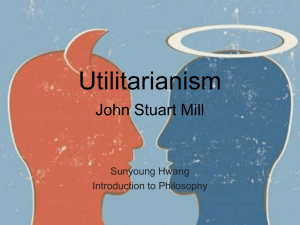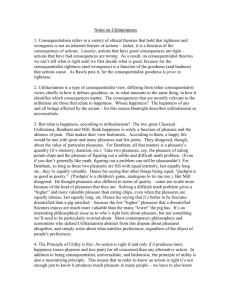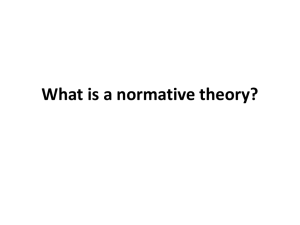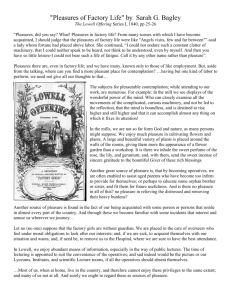Episode 02 February 23, 2012 Part 1 – PUTTING A PRICE TAG ON
advertisement
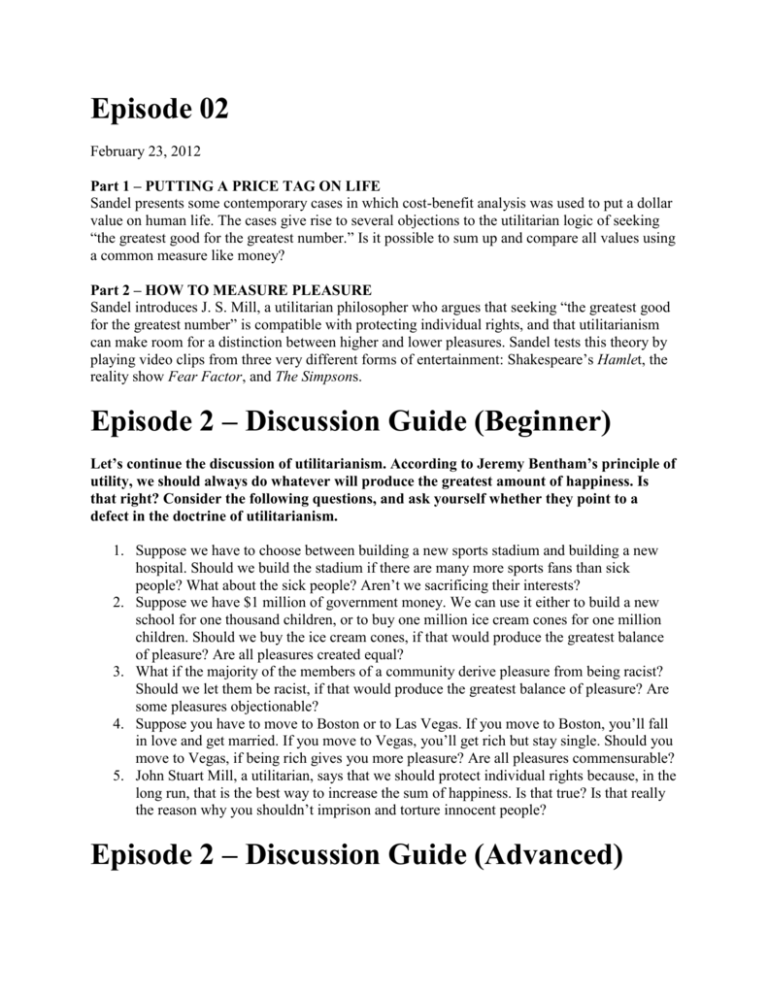
Episode 02 February 23, 2012 Part 1 – PUTTING A PRICE TAG ON LIFE Sandel presents some contemporary cases in which cost-benefit analysis was used to put a dollar value on human life. The cases give rise to several objections to the utilitarian logic of seeking “the greatest good for the greatest number.” Is it possible to sum up and compare all values using a common measure like money? Part 2 – HOW TO MEASURE PLEASURE Sandel introduces J. S. Mill, a utilitarian philosopher who argues that seeking “the greatest good for the greatest number” is compatible with protecting individual rights, and that utilitarianism can make room for a distinction between higher and lower pleasures. Sandel tests this theory by playing video clips from three very different forms of entertainment: Shakespeare’s Hamlet, the reality show Fear Factor, and The Simpsons. Episode 2 – Discussion Guide (Beginner) Let’s continue the discussion of utilitarianism. According to Jeremy Bentham’s principle of utility, we should always do whatever will produce the greatest amount of happiness. Is that right? Consider the following questions, and ask yourself whether they point to a defect in the doctrine of utilitarianism. 1. Suppose we have to choose between building a new sports stadium and building a new hospital. Should we build the stadium if there are many more sports fans than sick people? What about the sick people? Aren’t we sacrificing their interests? 2. Suppose we have $1 million of government money. We can use it either to build a new school for one thousand children, or to buy one million ice cream cones for one million children. Should we buy the ice cream cones, if that would produce the greatest balance of pleasure? Are all pleasures created equal? 3. What if the majority of the members of a community derive pleasure from being racist? Should we let them be racist, if that would produce the greatest balance of pleasure? Are some pleasures objectionable? 4. Suppose you have to move to Boston or to Las Vegas. If you move to Boston, you’ll fall in love and get married. If you move to Vegas, you’ll get rich but stay single. Should you move to Vegas, if being rich gives you more pleasure? Are all pleasures commensurable? 5. John Stuart Mill, a utilitarian, says that we should protect individual rights because, in the long run, that is the best way to increase the sum of happiness. Is that true? Is that really the reason why you shouldn’t imprison and torture innocent people? Episode 2 – Discussion Guide (Advanced) A good way to continue the discussion of utilitarianism is to describe its main features in detail and to evaluate each feature. Describing Utilitarianism According to the principle of utility, an action is right insofar it tends to increase happiness and wrong insofar as it tends to decrease happiness. In other words, the principle tells us that the right thing to do is always whatever will produce the greatest amount of happiness and whatever is necessary to prevent the greatest amount of unhappiness. But how are we supposed to figure out what to do in a particular, real-life situation? Suppose that we have to choose between building a new sports stadium and building a new hospital. According to Bentham, we should consider how much pleasure sports fans would get if we were to build a new stadium, and how much pain sick people would be relieved of if we were to build a new hospital. If building the stadium would produce a greater balance of pleasure, then we should build the stadium. This explanation reveals three important features of Benthamite utilitarianism. 1. For utilitarians like Bentham, happiness is simply pleasure and the absence of pain. People are happy insofar as they feel pleasure, unhappy insofar they feel pain; there is nothing else that goes into happiness. Abilities, achievements, friendship, love—all these are, at best, only means to being happy, and only insofar as they give rise to pleasure. 2. The second feature of Benthamite utilitarianism is that it counts all pleasures and pains, and it treats every type ofpleasure and pain as equal. If the quantity is the same, the pleasure of mocking someone counts just as much as the pleasure of helping someone. The pleasure of having a successful career can, in principle, be outweighed by the pleasure of eating a great many ice cream cones. The same goes for pains. The pain that someone feels when they are insulted can, in principle, be outweighed by the pleasure that another person derives from the insult. 3. The third feature of Benthamite utilitarianism is that it permits sacrificing one person’s interests for the sake of the majority. If the greater balance of pleasure would be produced by building a sports stadium rather than a hospital (say, because there are few sick people but many sports fans), then the principle of utility tells us to build the stadium—even if a small number of sick people will suffer greatly as a result. Evaluating Utilitarianism In your discussion, try to evaluate these three features: 1. Is it true that happiness is simply pleasure and the absence of pain, and that the goal of all human action should be pleasure? Or is utilitarianism too crude as a moral doctrine? 2. John Stuart Mill tried to defend utilitarianism against this charge by arguing that greater weight should be put on “higher” pleasures. But which pleasures are “higher” pleasures? Mill proposed that, of two pleasures, the pleasure preferred by a majority of people who had experienced both pleasures should be counted as the higher pleasure. Is this a good 3. 4. 5. 6. 7. way to distinguish “higher” from “lower” pleasures? Does the majority, even when it is well-informed, always prefer the “higher” pleasure? Does Mill’s proposal succeed in making Utilitarianism less crude? If not, is there another way to defend utilitarianism against this charge? Are all goods commensurable? Can they all be weighed on a common scale, or is it possible that the value of some goods, such as love, cannot coherently be balanced against the value of other goods, like money? Is this a fatal problem for utilitarianism? Do all pleasures deserve to be counted—even objectionable pleasures, like the pleasures that racists derive from being racist? John Stuart Mill thought that the right laws, education, and public opinion would prevent people from having objectionable desires. Was he right to be so confident about this? Either way, does the fact that utilitarianism counts all pleasures make it admirably neutral or hopelessly defective? Does utilitarianism threaten individual rights? What if the sum total of the pain caused by sacrificing the civil rights of a minority is less than the sum total of the pleasure derived as a result by the majority? John Stuart Mill tried to rebut the objection that utilitarianism cannot account for individual rights. He argued that, far from being in tension with individual rights, the principle of utility was actually the justification for protecting rights. In other words, Mill believed that protecting individual rights is the best way to increase the sum of happiness in the long run. Was Mill right? Either way, is this really the reason why we should not violate people’s basic rights?
